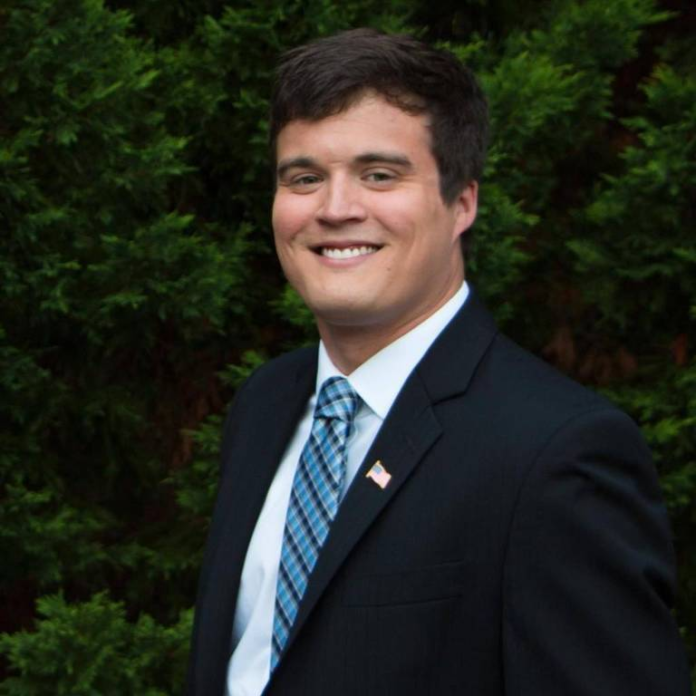
East Chapel Hill High School alumnus Ryan Watts, a Democrat, will face Republican incumbent Mark Walker, a Baptist minister, for representation of the Sixth Congressional District of North Carolina in the US House of Representatives in the November 6 election. Watts was formerly a senior strategy consultant for IBM, traveling around the country helping businesses. Proconian interviewed Watts about his campaign.
How did you become interested in politics? Why did you decide to run for office?
I’ve always been interested in politics, and I think that I’ve more specifically been interested in the problems that we, as a country, have yet to address and the problems of our future. What pushed me over the edge to get more involved and run, ultimately, was what happened in 2016. I was concerned about the direction [the election] would take our country in, and I think many of those fears have been realized in the first couple years of this administration. I’m most concerned about our role in global leadership. I want to address problems like changing climate, making sure that we are not undermining the working—and middle—class and making sure people have health care—basically the opposite of what this administration is doing. I want to see people in Washington speaking up for the future, so I decided enough was enough, and that we really needed to get in the game so that our future is not undermined.
What changes would you like to make if you win the election?
This democracy, our government, is an incredibly important institution. Leading the world and providing an example for how we conduct ourselves is something I don’t see being upheld. As just one member of 435 members of the House of Representatives, what I would like to accomplish is difficult. At a high level, my goal is to make sure we are representing the many and not just the privileged few. But specifically, from a policy perspective, everyone in this country needs help. The future of education is incredibly important; we are not funding education properly, and we are not prioritizing how we educate our children properly in the age of technology. From a broader perspective, [I want to] emphasize the needs of the many over the privileged few, because healthcare in America is more consolidated now than it’s ever been, and it is leaving people behind. The economy is also leaving people behind, so we need people who understand that, who have experience working with companies, and even people who work internationally, like myself, who understand what’s going on, so we can make some structural changes for the future. It comes down to [making] a healthier, safer and more prosperous future for everybody and really emphasizing the everybody.
Your opponent, Walker, has held the position since 2015. How do you plan on challenging his campaign?
I think we’ve already done a pretty good job of [challenging him]. It starts by shedding light on what he has been prioritizing. I like to assess each and every issue and policy and do my homework on them, because I really care about how individual policies impact the people, specifically of the district, but also more broadly. And I think his approach is taking the safe route. He speaks up on fake issues, like supporting our veterans, like minimizing the opioid crisis, like minimizing human traffic. Those are all things we all agree with. For all of the issues that are more controversial, he tends to stay silent, and he tends to just vote as he’s told, because he cares more about his career in politics than he does about the people in this district, and I think that has been proven time and time again. There is a need for new ideas and fresh perspectives for the future of the country, and that’s what we offer. I hate the way politics have become so divisive and the rhetoric—all of these things I find to be counterproductive. We’re not here to tell people [Walker] is a bad person; we’re here to tell people that his approach is bad and that the way he’s represented the people of this district is bad. It’s going to be a tough battle, but we’ve also done a really great job of a building a good campaign, a great team and huge volunteer support, and I hope that will make the difference.
What advice do you have for young people looking to get involved in politics?
First, I want every young person to challenge themselves: to challenge their points of view, to get a grasp of what each issue is. There’s not always just two [viewpoints]. Get a sense of what all the various opinion points are, assess them, and feel out what makes sense to you, and what you want to see in the future of this country. And once you’ve established that—and always be open to new ideas too; this is not something that is set in stone—you should challenge yourself, and then challenge your parents, and their points of view. Too often, young people get their points of view from their parents, and a lot of times young people have perspectives that they don’t challenge themselves to have. So challenge yourself, challenge your parents, challenge the status quo, and, most importantly, challenge elected officials to do better, to be responsible, to be accountable to you. I call on everyone to challenge the facts, to look independently at things. And that’s what I do, and I think it’s really led me to some conclusions that don’t fit into this black-and-white era of politics. Politics is shades of grey. Second, get involved in a campaign. It doesn’t matter what level of a campaign. It is eye-opening to knock on doors, to make phone calls, to send emails or text messages to people. [It’s] really eye opening to see how people are thinking, how people are talking. Third, make sure you’re registered to vote. Make sure you vote, especially in every election; local, state, federal—they all matter, and if you do not vote, you do not have the ability to complain about the outcome if it is different from what you might have wanted.











